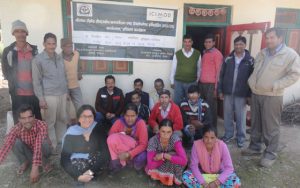This site uses cookies, as explained in our terms of use. If you consent, please close this message and continue to use this site.

Rural communities in the Kailash Sacred Landscape (KSL)-India have a rich tradition of beekeeping with the indigenous honeybee, Apis cerana. Over a quarter of households in these villages manage bee colonies traditionally in fixed-comb log or wall hives. However, to harvest honey from these types of hives the combs must be squeezed, resulting in low yield and poor quality honey. Squeezing the combs also kills the brood and adult bees, leading to a decline in colony strength. The small quantities of honey harvested by individual beekeepers using these traditional techniques is never enough to enter the mainstream market and is instead sold locally within the villages and in Pithoragarh in Uttarakhand.
The Innovative Livelihoods and Climate Change Adaptation component of ICIMOD’s Kailash Sacred Landscape Conservation and Development Initiative (KSLCDI) is working with the Central Himalayan Environmental Association (CHEA) – a local organization – to increase the income of these communities, including poor and vulnerable and women, by introducing and promoting improved methods of beekeeping to increase production and enhance the quality of honey.
The server encountered an internal error or misconfiguration and was unable to complete your request.
Please contact the server administrator at webmaster@icimod.org to inform them of the time this error occurred, and the actions you performed just before this error.
More information about this error may be available in the server error log.
Additionally, a 500 Internal Server Error error was encountered while trying to use an ErrorDocument to handle the request.
As part this initiative, ICIMOD and CHEA conducted two 7-day village-based trainings to build the capacity of local beekeepers in modern beekeeping. The first training was conducted in Kanthagaon from 18 to 24 November 2015 for 22 participants (18 men and 4 women) from three pilot villages (Gogana, Khitoli and Selguwani). The second training was conducted in Nisni from 26 November to 2 December 2015 for 16 participants (all men) from Nisni and nearby villages. In addition to the bee farmers, some field staff from CHEA also attended.
The trainings were conducted by Aniruddha Nath Shukla and Uma Partap from ICIMOD and Hemant Kumar Bora of CHEA. The training was designed to be interactive and the sharing of experiences was encouraged. A variety of training methods were used, including lectures, videos, group discussions, and the sharing of experiences. The farmers learned the skills involved in modern bee management. The topics covered included the use of movable-frame beehives and other bee equipment; colony inspection, cleaning, and feeding; seasonal bee management; uniting and dividing colonies; the management and control of swarming, absconding, robbing and laying workers; the management and control of bee diseases, pests and predators; bee flora; harvesting, processing, value addition and the quality management of honey and beeswax; and the importance of bees in providing pollination services to crops and natural vegetation. Participants were also introduced to advanced topics such as the value chain concept, the branding and marketing of honey and other bee products, and mass queen rearing.
The training helped the participants to gain valuable skills and participants said that the training has motivated them to use modern equipment and methods of bee management. They appreciated the content, curriculum and structure of the training and thanked ICIMOD and CHEA for organizing it. Some also asked ICIMOD to organize a more advanced training of trainers in Kathmandu in near future.
Stay up to date on what’s happening around the HKH with our most recent publications and find out how you can help by subscribing to our mailing list.
Sign Up